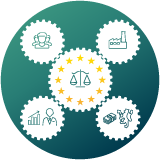Barriers to and possibilities for sustainability
A first important step in SMART was to undertake a comprehensive analysis of the state of art on market actors’ contribution to sustainability. Concentrating on the global value chains of products sold in Europe, our analysis bring together the results of research done on the level of international law and policy, on the EU level, and the level of selected Member States. We complemented our regulatory analysis with bottom-up studies of the life cycles of textiles and mobiles, identifying a variety of factors that keep production and consumption of products on a linear and unsustainable course (video 1 m 14 s).
We identified the barriers, gap and incoherencies in the regulatory frameworks that keep market actors form making more sustainable decisions. We also identified possibilities that need to be enhanced if we collectively are to move towards sustainability. Our analysis was summarised in the 2018 report Obstacles to Sustainable Global Business.
Supporting the transition to sustainability
With our comprehensive analysis as the foundation, we developed reform proposals to achieve the necessary change. We strongly believe that achieving sustainability is possible (video 1 m 27 s). The transition to sustainability has a firm legal basis in the EU’s overarching goals set out in its Treaties, with duties to protect the environment, human rights and human dignity, within the EU and in the EU’s relations with the wider world. To achieve sustainability, we need to change the way business operates.
Our elaborate set of reform proposals aims to support the transition to sustainability, as we outlined in our introductory 2019 report Supporting the Transition to Sustainability. Our reform proposals seek to change the way business and finance operate, and the way products are produced and consumed. We aim to make it possible and easy for business and finance to create value in a sustainable manner, and for products to be produced and consumed in a way that contributes to securing a safe and just space for humanity within planetary boundaries. The detailed proposals are presented in three main reports, with sustainability due diligence as a common thread.
In Securing the Future of European Business, we present suggestions for how international trade and investment law better can support sustainable business, and how sustainability can be integrated in to the purpose of business and the duties of the board (video 5 m 52 s). In Financing the Transition to Sustainability we aim to strengthen and broaden the EU’s Sustainable Finance Initiative, ensuring that both public and private funding is geared towards sustainability (video 7 m 15 s). In Towards a Sustainable Circular Economy, we make suggestions for how sustainability can be fully integrated into the production and consumption of products in the EU (video 5 m 3 s). In addition, there is a separate report feeding into the latter one: Sustainability Through Public Procurement.
Our reform proposals concern the EU as a global actor, and the EU as a legislator and policymaker. We have also developed SMART guidelines to make the EU’s policy coherence for development fit for purpose, and SMART guidance for the sustainability assessment process in business.
Facilitating corporate sustainability research
Aiming to encourage others who wish to pursue interdisciplinary corporate sustainability research, we concluded our SMART project with an open access version of our Research Guide: Facilitating Interdisciplinary Corporate Sustainability Research: The SMART Research Guide.
SMART legacy plans
As many as possible of our SMART outcomes are freely available and we hope they will inspire academic as well as a broader public debate on how to achieve sustainability.
We continue the research, individually and in new projects, as well as our industry engagement through our Business and Finance Forums, and the broader stakeholder engagement. We will seek to integrate the SMART results and insights into teaching and curricula across our SMART partner universities and beyond, to contribute to shaping the next generation of scholars and practitioners.
Sign up to our newsletter Companies, Markets and Sustainability to stay in the loop, and feel free to contact us with any questions or suggestions.
About SMART
The SMART project was funded by the European Union’s Horizon 2020 research and innovation programme and brought together over 70 scholars from 25 research institutions around the world. The project ran from 1 March 2016 till 29 February 2020. The project was coordinated by Professor Beate Sjåfjell.
